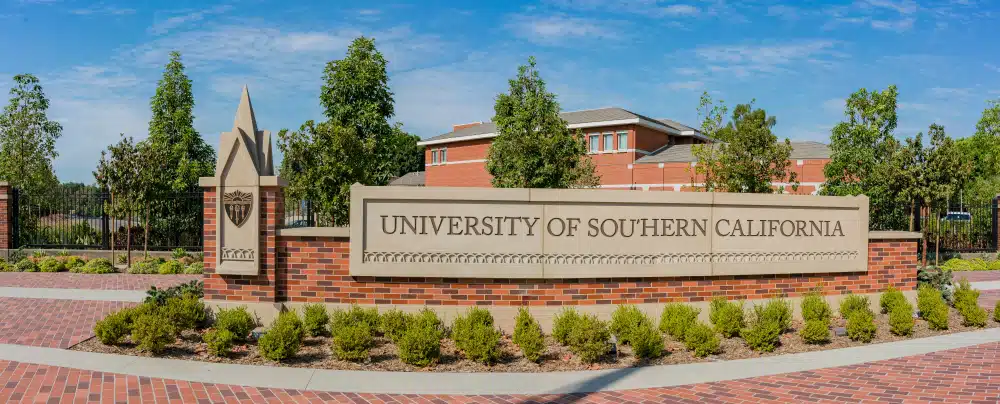The University of Southern California (USC) is one of the top and most-recognized private research universities in the country. With over 18,000 students, 4,767 staff, and around 82,027 applications in the 2024-2025 school year alone, it’s no surprise that a stay in USC can be a great one. That said, as an incoming student yourself, you’ll definitely want to keep track of USC’s academic calendar closely to stay on top of your academic progress.
In this blog, we’ll be tackling this university’s academic calendar, what its monitoring could mean for your overall academic progress, and significant dates to look forward to as an incoming student.
- Is USC on a Semester or Quarter System?
- When is USC’s Start Date?
- USC’s School Schedule
- When Is USC’s Fall Break?
- When Is USC’s Winter Break?
- Student Life at USC
- Frequently Asked Questions
- Takeaways
Is USC on a Semester or Quarter System?
USC’s academic calendar operates on a semester school year system, beginning in the Fall of the current year, and then continuing to the next year. For all incoming freshmen out there, USC’s upcoming school schedule will be as follows:
- Fall 2024
- Spring 2025
- Summer 2025
Fall and Spring are the main two semesters for the school year, with additional summer classes being offered as well. Typically, each semester lasts around 16 weeks from the beginning of classes, with some short breaks in between.
When Is USC’s Start Date?
According to USC’s official academic calendar, classes typically begin in the Fall semester, around August each year.
From there, classes are held regularly, with a small lull in between to allow you to change or drop a course from your class schedule, as well as for senior students to send in their applications for graduation. After that, it’s classes straight to finals, all the way to the next and final semester of the school year.
The USC School Schedule for the 2024-2025 School Year
An outline of USC’s official school schedule is as follows:
Fall 2024
Classes for all students begin around August 19th to 20th, with faculty returning to campus days earlier to help with preparations. During this time, you can adjust your final class schedule until the end of the first week of classes. As September begins, you’ll enjoy a short break for Labor Day.
After a brief break around the presidential elections, regular classes will resume until finals in December. On the Columbia campus, this will be followed by commencement exercises for students who have applied and been approved for graduation.
Spring 2025
January marks the beginning of USC’s Spring semester, with a break just a week later to commemorate Dr. Martin Luther King Jr. Service Day. From then on, classes continue regularly, much like the previous semester, until final examinations in May. Students on the Columbia campus will also have their commencement exercises at the end of the semester. And, of course, Spring Break is eagerly anticipated.
Summer 2025
If you’re looking to complete more units or retake courses you previously dropped, USC’s academic calendar offers the option to enroll in summer programs. Registration dates for summer classes may vary depending on the campus or degree program. You can find these details through the university’s self-service portal or by waiting for further announcements from your dean or program heads.
Fall Break in the USC Academic Calendar
The Fall semester includes around four breaks for both students and faculty to look forward to, and USC’s Fall break typically occurs in October. It’s a short break, giving you just enough time to unplug and catch up on your studies.
There are many things you can do during Fall break, such as:
1. Spending time with family and friends
Being away at college can understandably be draining, so why not spend some time with family and friends during Fall break before returning to class? This way, you can refresh after long periods of study and reconnect with familiar faces back home.
2. Catching up on your studies
As mentioned earlier, Fall break is also a great time to get some extra studying done, especially since it’s often a signal that finals are just around the corner. At most universities, including USC, students are generally allowed to stay on campus during the break, provided the residences remain open—though policies may vary depending on the campus.
If you decide to go home for Fall break, you can still make time for studying on your own. While some campus facilities may be closed during the break, there are usually plenty of study areas available, making it easier and more conducive to focus on your studies.
3. Unwinding
All in all, both Fall and winter breaks are perfect opportunities to unwind and relax as much as you need. This time off can benefit not only your mental health but also your physical well-being. After all, life isn’t just about studying—you should always make room for some leisure as well.
Winter Break in the USC Academic Calendar
Fall and Spring breaks aren’t the only highly anticipated holidays during the school year—USC’s winter break is just as eagerly awaited. With the holidays approaching, you’ll definitely want to take advantage of that time off!
According to USC’s academic calendar, winter break typically starts in December and ends in January, giving you the perfect opportunity to go home and celebrate the holidays with your loved ones.
Student Life at USC
College can be an invigorating experience for many, but also a daunting one for some. Imagine stepping into an entirely new environment, unfamiliar with your surroundings and unsure of the culture.
It can be a big adjustment, but student events make the transition easier. Not only do they give you the opportunity to meet new people and learn new things, but they may also provide a platform to showcase and develop your talents. Plus, they’re just fun—and you can participate as much as you like!
There’s so much to look forward to in the student experience. Let’s take a closer look at what’s in store:
Student events
College can be an entirely new experience for both you and others. Fortunately, with a wide variety of on-campus events, you’ll never run out of entertainment during your time at USC.
Through the Garnet Gate platform, you can stay updated on ongoing and upcoming campus events. Notable activities include Service Saturdays, various engagement initiatives, and events that support philanthropic causes.
Additional student events can also be found on USC’s official academic calendar and the university’s event calendar.
Different class setups and the use of lecture halls
USC possesses a large student body—perfect for cultivating an environment that’s conducive to collective learning. In short, perfect for filling up the lecture halls!
Lecture halls are some of the most recognized and essential locations in any college, as not only can these venues host large numbers of students for one gathering, they also serve as hallmarks to some of the most memorable classes you’ll be having during your stay!
Beyond their nostalgic value, lecture halls serve as excellent venues for a wide range of courses, accommodating students from any degree program without limitations.
College classes, however, are quite diverse in how they operate. Unlike the rigid daily eight-hour structure you may be used to, your schedule at USC will offer flexibility, allowing you to choose, change, or drop classes. However, attendance often remains crucial to your final grade.
Class structures vary throughout the semester. Some classes might meet three times a week, some may place less emphasis on attendance, and some may take place in either typical classrooms or lecture halls. You can expect around 68 instructional days in the Fall semester and 73 in the Spring, with at least three study days before finals.
College professors having different consultation times
Another notable difference from classes in a high school setting are the instructors themselves. If you remember back in high school, your teachers would almost always be available for you throughout the school day. In terms of class scheduling, you may have also seen them teach multiple subjects, or just in the halls every day.
Professors, however, operate on an entirely different level. In addition to handling lectures, creating lesson plans according to the course program, and grading assignments and research papers, they also hold office hours on certain days—ensuring that you can seek counsel from them. They, in turn, can devote time for you by setting appointments, which you will definitely need to plan around effectively.
While similar in function, the differences between teachers and professors are also notable; teachers teach according to their class’s grade level, while professors create the entire curriculum for their class to follow for the year.
Frequently Asked Questions
1. Does USC remain open during breaks?
Yes, some students remain on campus during breaks and use this time to get productive with the school’s academic resources. Typically, residence halls remain open during breaks, except on finals.
2. What type of student events can be expected at USC?
The University of South Carolina is filled to the brim with exciting student events! Notable examples include tech conferences, holiday celebrations (i.e. Pride Month, etc.), and the annual Fall Literary Festival.
3. How many breaks are there according to the USC academic calendar?
Counting in the Fall, Spring, and Winter breaks during the school year, as well as holidays such as Veterans Day and Labor Day, there are a total of seven breaks to be expected during the school year.
4. Does USC offer financial aid to incoming students?
Yes, all USC students are eligible to apply for financial aid, especially incoming undergraduates. To do so, simply send in your applications by December 13th for Early Action applicants, and February 5th for Regular Decision applicants, and ensure that all requirements are on-hand and submitted accordingly.
5. When do classes at USC usually begin?
According to USC’s academic calendar this year, Fall semester classes begin on August 26th. Spring semester classes will start on January 13th, and the optional summer semester will begin on May 21st of next year.
Takeaways
When keeping track of USC’s academic calendar, remember the following:
- The University of South Carolina operates on a semestral basis. It currently has three semesters for students to enroll in: Fall, Spring, and Summer.
- There are 68 instructional days in the Fall semester and 73 instructional days in the Spring semester, with study days allotted for at least three days before finals.
- As a university student, you have the flexibility to customize your schedule by adding or dropping courses during the first week of classes, allowing you to create an optimal class setup.
- Breaks provide a much-needed pause from school before finals. You can either stay on campus to catch up on your studies, or go home to be with family and loved ones—whether to study or to enjoy a well-deserved rest.
- Want to learn more about USC’s academic calendar and what to expect? Consult a college admissions expert—they can help ensure everything is on track as you begin your journey at USC.






































